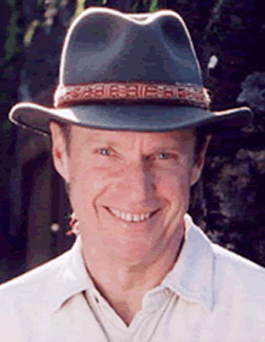home | north bay bohemian index | features | north bay | feature story

YOU ARE LOVE: Allan Hardman explicates the Toletc path.
Joy Dancing
Allan Hardman directs budding Toltec warriors
By P. Joseph Potocki
Anyone coming of age from the late 1960s onward likely read or at least knows the name Carlos Castaneda. This Peruvian-born anthropologist's dozen hallucinogen-laden books chronicling his personal spirit-world sojourns racked up sales eclipsing 8 million copies. Castaneda's writings inspired a host of devotees as well as a sub-industry of symbiotic published works. A recent addition to this genre is The Everything Toltec Wisdom Book (Adams Media; $14.95), by Santa Rosa author Allan Hardman.
Scholars dispute the veracity of books detailing Castaneda's apprenticeship to the wily old Yaqui Indian sorcerer, Don Juan Matus, but it sure was good reading while high or angling to get there. Castaneda was the Thomas Pynchon of America's aboriginal mystics. His claims were not only tough to pin down, but his whereabouts were intentionally obscured for decades. (Castaneda did, however, resurface in the 1990s to promote a for-profit venture called Tensegrity, claiming the discipline had been handed down to him through 25 generations of Toltec shamans.)
There's a measure of controversy and confusion about the Toltecs, too. Toltecs are said to be a Mesoamerican culture vanquished by northern Mexican frontier tribes more than 800 years ago. Toltecs were militaristic imperialists charged with sacking and burning the great city of Teotihuacán around 900 A.D. Some say they enthusiastically performed human sacrifice, though legend has it that their equally legendary king Quetzalcoatl abhorred the practice. Still others claim the Toltecs exist only in Aztec myth and storytelling.
One thing's for sure: human-sacrificing war mongers aren't likely to conjure up gentle visions any love-based spiritual legacy would wish to emulate. But in Castaneda's universe, a Toltec is someone who has attained a heightened state of spiritual development. Castaneda's Don Juan claimed the Toltecs were ancient sorcerers from thousands of years past, meaning they arose long before the questionably historic Toltecs arrived on the scene.
All of which actually does lead back to Hardman's The Everything Toltec Wisdom Book. It's a how-to manual for Toltec spiritual warriors, subtitled A Complete Guide to the Ancient Wisdoms. "I really was dedicated to creating a book of tools," Hardman explains. He honed his own Toltec tools by apprenticing for 10 years under Don Miguel Angel Ruiz, the former surgeon whom Oprah Winfrey and Ellen Degeneres helped propel to bestselling literary stardom by recommending Ruiz's 1997 book, The Four Agreements.
Hardman met Ruiz when Hardman and his partner joined the Church of Religious Science, since renamed the Center for Spiritual Living, in Santa Rosa. "We used to call the church and their teachings the lecture, and Miguel Ruiz the lab," Hardman says. Having been on a spiritual quest for much of his life, voraciously reading, experimenting with psychoactive drugs and going on pilgrimage to India, Hardman acknowledges that many spiritual and religious traditions project "life as love, as brothers and sisters manifested through some creative force."
Asked why, with many spiritual traditions to choose from, he sought to become a Toltec master, Hardman replies that in Miguel Ruiz he found a man "completely within his body. He loved to eat, he loved sex, he loved people, he loved hugging. He was so alive, and I thought, 'Wow, that's so much better than trying to believe I'm not that—that I don't have lusts and I don't have appetites and I don't have fears.'" Hardman says he sought out Ruiz because "I don't want to learn how to transcend or struggle away from many of these human truths that I embody. I want to know how to come back to that and embrace them, and in doing that to recognize the divinity that is creating those things within me."
Years earlier, a near-death out-of-body experience years had compelled Miguel Ruiz to seek guidance from his own mother. She was a famous curandera, or healer, in the ancient Toltec tradition, just as her father, Ruiz's grandfather, had been a Toltec nagual, or shaman. And, not surprisingly, both Ruiz and his disciple Hardman each engage some of the same psychic-scapes as the late author of the don Juan books. "Castaneda doesn't talk much of or call it Toltec much," Hardman explains, "but he does talk of it, and it's the same tradition." He adds, "There are a lot of great tools in this tradition, and I added a few of my own, so that's the main focus of my book."
Send a letter to the editor about this story.
|
|
|
|
|
|